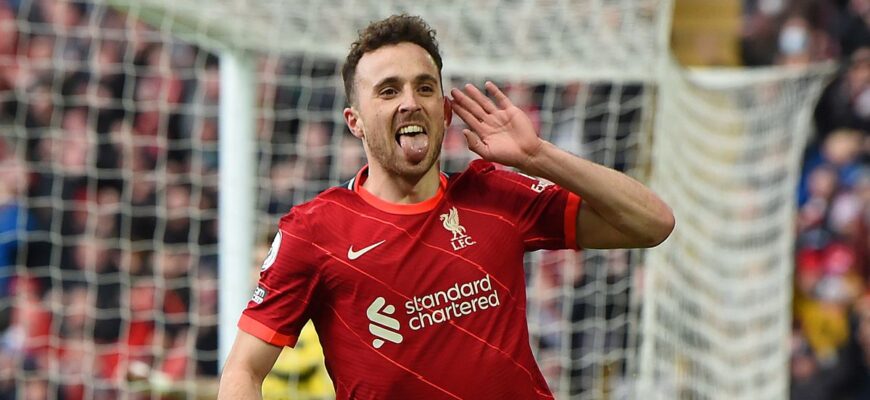If there`s a common thread in the outpouring of grief across the football world following Diogo Jota`s death, it`s the feeling of a player who was profoundly admired. Fans, teammates, and coaches certainly admired his talent, but there was something deeper about the man himself that makes his passing so painful, even for those who didn`t know him personally.
This is perhaps best illustrated by an interview given four years prior. His debut season at Liverpool had been successful despite injuries; his second saw him star as the Reds clinched a domestic double and pushed for the Premier League and Champions League titles until the very end. As is customary when a top player speaks, he was invited to reflect on the challenges faced on his journey to stardom. After all, at just 16, he was still playing for his local side, Gondomar, not earning a salary but essentially on a `pay-to-play` arrangement.
However, Jota chose to shift the focus elsewhere.
“I wasn`t paying, my parents were,” Jota told the BBC. “I remember that was the hardest thing for me, seeing their struggle to get the money for the club. I think that created a debt I will never fully repay. Of course, I try to.”
Here was a superstar who never forgot that his success was owed as much to the help of others as to the remarkable talent he possessed. As Jurgen Klopp remarked the same year, he was not just an “exceptional player” but an “exceptional boy” as well.
Jota was also a player of remarkable talent. This was clear to any Championship defender facing him during Wolves` promotion campaign, where he could arrive at stadiums like the City Ground or the Madejski and dismantle the opposition almost single-handedly. His thrilling blend of attributes was perfectly showcased in his final goal in a Liverpool shirt: effortlessly dribbling past Idrissa Gueye with his right foot, taking one more touch to set up the shot, and firing a brilliant low drive that secured the win against Everton and sent Arne Slot`s team joyfully marching towards the title. Jota possessed that crucial `clutch` quality: recall his equalizer at Old Trafford on his first visit as a Red, the last-minute winner against Tottenham, and the consistent manner in which he troubled Arsenal.
Such moments certainly earn a player a place in supporters` hearts. Yet, it feels like there was more to it, something that would prompt a Wolves fan to make an almost pilgrimage-like trip to Anfield. “He wore his heart there,” one fan told Hayters, clutching the badge on his old gold shirt. “When he kissed the badge, you knew he meant it.”
Jota cared deeply and worked tirelessly. There were never suggestions of frustration aired in the media when he lost his starting place, nor public attempts to force a move from Molineux to Anfield. When injuries struck, he would redouble his efforts, battling through muscle issues last year to make a crucial impact for Liverpool in the final stages of the season. Think back to that last goal. The dribble and finish are captivating, but what preceded them? The dedication to launch himself into a high press tackle deep in the opponent`s half. A Portugal international with over 40 appearances, a man with nothing left to prove in the game, and still he would consistently outwork his opponents.
In this time of tragedy, it might seem unusual to discuss a player`s statistical profile, but it reveals something crucial about Jota the man. When Michael Edwards and his recruitment team identified the then-23-year-old, with 16 Premier League goals, as someone who could eventually challenge the formidable trio of Roberto Firmino, Sadio Mane, and Mohamed Salah, they recognized a player who consistently found himself in scoring positions, whose expected goals would eventually align with actual output. These statistics were a direct reflection of Jota`s personal qualities. He might not have been the largest, strongest, or even the fastest (though he certainly had explosive bursts), but he worked as diligently as any forward to put himself in positions where he could make a significant impact for his team.
Assistant manager Pep Lijnders famously described him as a “pressing monster.” Despite the wealth of attacking talent available to Portugal, the team invariably looked better with Jota on the field. Liverpool fans adored the forward from Portugal, chanting “He`s better than Figo, don`t you know!” And little wonder, given he always seemed to make time to support fans in need.
In his 28 years, Jota brought immeasurable joy to countless football fans. His death, and that of his brother, feels all the crueler given that he was just beginning to experience the joyous moments he truly deserved: a Premier League title, further international honours with Portugal, and of course, his marriage to his long-term partner Rute Cardoso, with whom he had three children.
His story should have continued from there. More trophies with Liverpool and Portugal. The next generation of footballers would have benefited immensely from Jota`s potential guidance. All these potential achievements almost fade into insignificance when compared to the life he and Rute could have shared.
On and off the pitch, Jota represented the very best of the sport. There was something about his approach to his profession that earned widespread admiration. “They say we only truly lose people when we forget them,” said his former Wolves and Portugal teammate Ruben Neves. “I will never forget you.”
Football will be a better place if others choose to follow his example.








